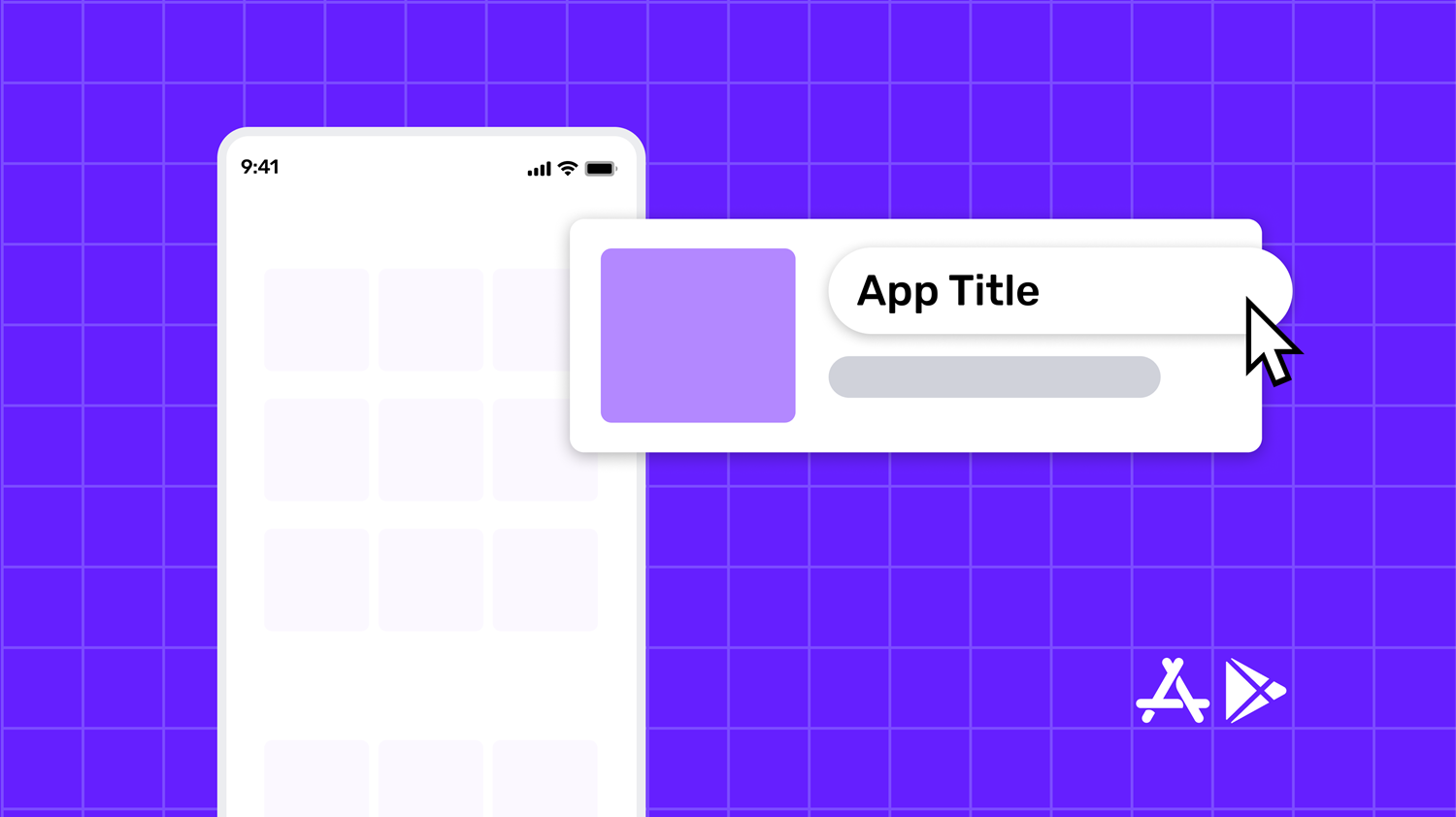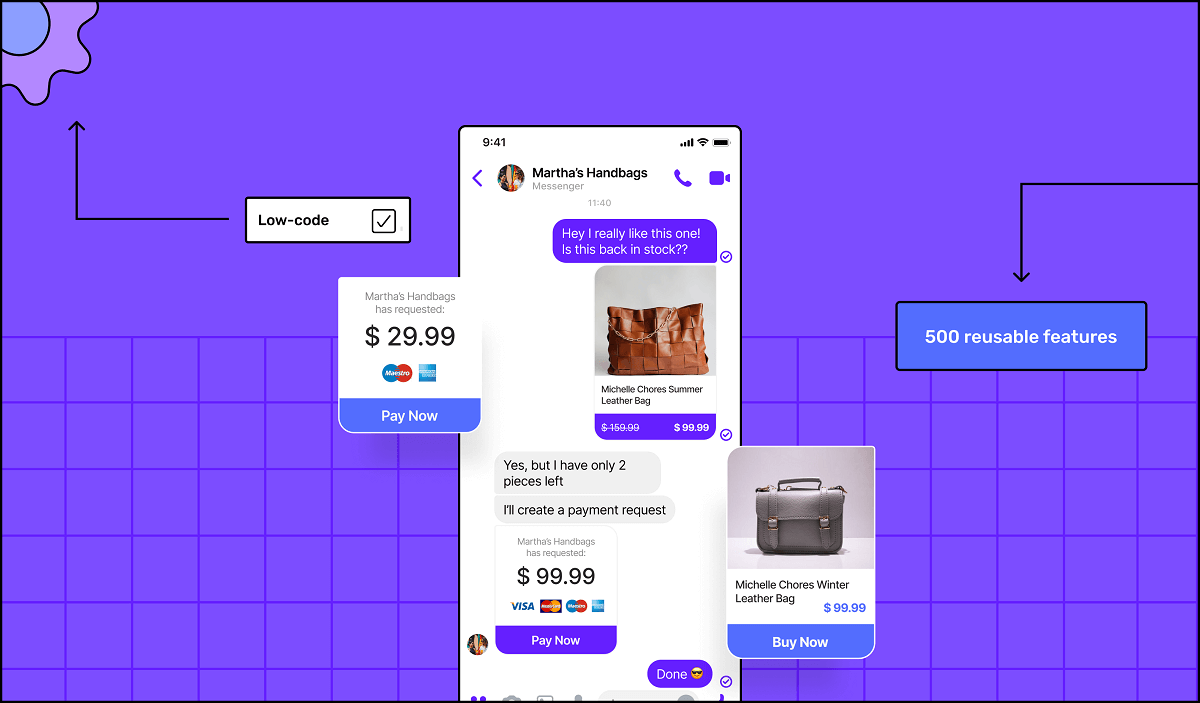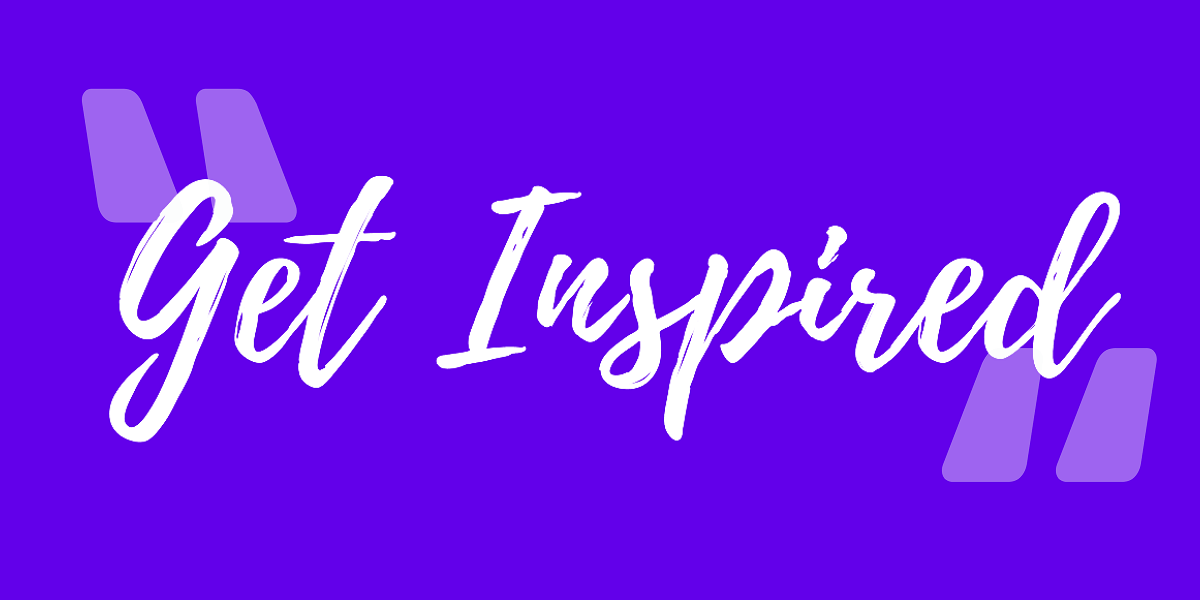Already made a billion-dollar exit from a company you founded that occasionally sends spacecraft into orbit?
Then you can arguably get away with calling your latest vanity project “X”.
If not, it’s worth picking a name for your app that’s catchy, memorable and relevant to your audience.
In this blog, I’m going to explain the art of naming an app and how to name your app that shines and stands apart from your competitors:
- Conducting competitor research for your app category
- Following industry best practices
- Learning from the most successful companies in the app market
I’m also going to share an app naming framework that’ll help inspire hundreds of ideas of your own.
But first, let’s emphasise exactly why you should bother investing time into the process before you think about building an app 👇
Why you NEED to spend time on your mobile app name
1 - First impressions matter
Your app's name is the first thing potential users encounter.
On the one hand, a well thought out name can immediately communicate its purpose or the value it can add. On the other hand, complicated names or ones with negative connotations may either fail to capture users’ attention or drive the wrong kinds of users to download your app.
2 - Brand recognition
Your app's name gives you an opportunity to be remembered – hopefully for the right reasons. These are the foundations from which you can build your brand and become a recognised player in your niche.
3 - App marketing
When marketing your app, you can playfully use your name in creative campaigns on social media. Unforgettable names can also reduce your advertising spend, especially if they clearly communicate the people you help and the problems you solve.
7 steps to conducting thorough competitor research
Now that you’re convinced it’s worth putting time and effort into your name before you create your app, it’s time to get the ball rolling.
And your first port of call is to analyse your competitors' app names.
Here, you should identify app naming trends, relevant keywords and potential pitfalls to avoid so you can get the attention of your target audience and capture an app market share.
Let’s see how you can conduct comprehensive research in 8 steps 👇
1 - Identify your competitors
Start by creating a list of your direct and indirect competitors. Direct competitors offer similar products or services, while indirect competitors might have a broader range but still overlap with your app's offerings.
2 - Analyse competitors' app names
Once you have your list, thoroughly analyse your competitors' app names. Pay attention to the following aspects:
- Length- note the length of their app names; are they short and concise or longer and descriptive?
- Keywords- identify relevant keywords or key terms used in their names; these keywords often reflect the app's primary features or functionalities
- Branding- evaluate how competitors use their names to convey their brand identity or values; is the name reflective of their brand personality?
- Uniqueness- determine if their names are unique within the industry or if they follow common naming conventions
3 - Identify naming trends
Examine naming trends prevalent in your industry.
For instance, in the food delivery app niche, you may notice a trend where many competitors use words like "Eat," "Deliver" or "Order" in their names.
Prime examples of this are "Uber Eats" and “Just Eat” in the UK, where the use of the verb "Eat" makes it obvious that the app category is food delivery.
4 - Create differentiation
Consider how your app can differentiate itself from the competition. In a crowded field like food delivery, you'll want a name that not only sets you apart but also resonates with your target audience.
For example, "Just Eat" successfully stands out by conveying a sense of simplicity and convenience. In contrast, "Uber Eats" capitalises on the well-known Uber brand, leveraging its reputation for reliability and efficiency.
5 - Domain availability
Having domain names that match app names is a significant branding advantage. Alternatively, you can check domain name availability and use your tool’s suggestions as inspiration, but you’ll need to ensure that they align with your brand values.
6 - Trademark and copyright
Imagine you're planning to launch a photo-sharing app, and you come up with the name "InstaPics." It seems catchy and fitting for your app's purpose.
However, during your search, you discover that "Instagram" holds a trademark for the term "Insta" in the context of photo-sharing and social networking. Using the name "InstaPics" could potentially infringe on Instagram's trademark rights, leading to legal issues and potential legal action.
To avoid such complications, it's crucial to conduct trademark searches and ensure your chosen app name doesn't infringe on existing trademarks or copyrights. This due diligence can save you from costly legal battles and protect your brand's reputation.
7 - User preferences
Consider conducting surveys or focus groups to understand your app audience's preferences and expectations regarding app names. Their feedback can be invaluable in making informed decisions.
Now that you have an extensive research on your competitors, you need to align your business’s purpose with your user personas…
Want to start your app project with us?
Book a demoSpeak with one of our product experts today.
By proceeding you agree to Builder.ai’s privacy policy and terms and conditions

6 app naming best practices
Once you have all this information to act as a basis, I’m sure you’re brimming with name ideas! So, let’s start trickling these app-naming best practices down to the one.
Step 1: Reflect on your app's features
Make a comprehensive list of the core features and functionalities your app offers. This exercise will not only help you understand your app better but also provide a solid foundation for brainstorming keywords and concepts that are related to your app's purpose.
You should consider what makes your app unique. What pain points does it address? Why would users want to download and use it? Reflecting on these questions can help you generate ideas that are directly connected to your app's core value proposition.
Step 2: Don't get too attached to any name
While brainstorming, it's essential to avoid becoming too attached to any specific name. Being inflexible at this stage can lead to disappointment if your chosen app name is unavailable or doesn't meet other technical requirements.
Step 3: Keep the name short and sweet
Mobile app stores often have character limits for app names. Here are the character limits for 3 biggest and most popular app stores:
- Google Play Store (Android) - On the Google Play Store, the maximum character limit for an app title is 30 characters
- Apple App Store (iOS) -The maximum character limit for an iOS app name is 30 characters.
- Amazon Appstore (Android) - The Amazon Appstore has no character limit
It's vital to ensure that your app's name is concise and easy to remember. A shorter name is more likely to be memorable and shareable, which is a significant advantage when it comes to word-of-mouth marketing and referrals.
Top tip
You could also potentially think about creating an app name that can fit into your larger marketing message.
For example, the app "Lyft" aligns its app name with its larger marketing message by using a concise and memorable name that represents the action of getting a ride.
Their marketing campaigns often feature phrases like "Get a Lyft" or "Request a Lyft," making the app's name and marketing message harmonise seamlessly!
Step 4: Include descriptive words
Incorporating descriptive words in your app name is a wise strategy. These words directly communicate your app’s category or its primary function, so when potential users see your app in the store, they have a clear understanding of its purpose.
Think about the keywords that users might enter when searching for an app similar to yours.
For instance, if your app focuses on fitness tracking, you could include words like "Workout," "Health" or "Activity" alongside broader terms like "Fitness" and "Tracker."
Also think about the unique selling points of your app – whether it's personalised workouts, diet tracking, or mental health support – and integrate related keywords.
By doing so, your app name not only clearly defines its purpose but also captures the essence of what sets it apart, making it instantly appealing and recognisable to potential users.
Step 5: Use action words
Action words add momentum and clarity to your app's name. These words convey a sense of what the app does and what users can expect when they use it. Incorporating action words in your app name can make it more engaging and relatable to users.
Take, for instance, a fitness tracking app. A name like "RunTracker" not only explicitly communicates the app's function but also injects a sense of motion and activity into the name.
This not only adds an element of excitement but also helps potential users immediately grasp the core function of the app. Action words connect users with the experience they can expect, making your app name memorable and inviting.
Step 6: Don't try to be too clever
While creativity is a valuable asset when naming your app, it's essential to strike a balance.
Avoid making your app name overly complex or too clever to the point where it becomes hard to understand or remember. Your app name should be creative but not at the expense of user comprehension.
Now, let’s see how real companies applied these principles to create sticky mobile app names…
6 app names from the real world that stuck
The journey of app naming is paved with both successes and failures! Let's explore some real-world app name examples to understand the art of naming.
1 - Instagram
Instagram's name is a combination of "instant" and "telegram." This name effectively communicates the app's core purpose - sharing instant photos and updates with friends. It also carries a sense of speed and immediacy, which is essential for a social media app.
2 - Spotify
Spotify is a blend of "spot" and "identify." The name implies that users can spot and identify their favourite music instantly, emphasising the app's ability to stream and discover music. It's short, memorable and directly related to its service!
3 - Airbnb
Airbnb stands for "Air Bed & Breakfast." It bears a special connection to its founders, Brian Chesky, Joe Gebbia and Nathan Blecharczyk.
In the early days, the founders rented out air mattresses in their apartment to earn extra income! This clever combination not only showcases the journey of the founders but also communicates to users that they can discover lodging alternatives beyond traditional hotels.
The name is catchy and instantly conveys the core concept.
4 - Tinder
Tinder, which means dry material used for starting a fire, is a clever metaphor for the app's purpose - sparking connections and igniting relationships! It's short, memorable and has an element of intrigue, making it a great choice for a dating app.
5 - Netflix
Netflix is a combination of "internet" and "flicks" (slang for movies)! This name indicates that users can stream movies and TV shows online. It's straightforward, memorable and perfectly encapsulates the service.
6 - Duolingo
Duolingo is a combination of "duo" (for two languages) and "lingo" (language). This name is ideal for a language-learning app, as it signifies that users can learn two languages and emphasises the app's primary function.
These real-world examples demonstrate how app names can be both creative and informative, conveying the app's purpose while making it memorable and engaging.
Use THIS app naming framework to inspire 100s of sticky app name ideas
Although you could strike gold by randomly coming up with the perfect app name in the shower or while walking the dog, frameworks will help you generate ideas in a focused way. Use the examples in the table below to inspire potential names of your own 👇
Mental health app | Hospitality app | |
Values | Positivity, empathy, compassion, transparency, community | Helpful, efficient, compliant, data driven, user friendly |
Purpose | To help young people improve their mental health through physical exercise via a dedicated social media community. | To help hospitality organisations calculate and manage their daily pricing for each individual property in their portfolio, while reducing price distribution errors. |
Target Audience | 11-18-year olds with mental health challenges | Small and medium-sized hotel owners |
Name |
1 - Define your app's core values
Your app’s core values need to align with your brand.
For example, as mental health advocates, Moodit, wants to help get its users moving and improve their mood.
Wordplay combining these two concepts conveys positivity, while also clearly explaining the purpose of the app.
2 - Communicate your app’s purpose
Using your app name to communicate what your app does allows users to instantly understand the outcomes your app will help them to drive.
For example, MyRatesMagic is a tool focused on providing a solution to a particular problem. As a result, specifically mentioning both “rates” and “magic” in the name clearly outline the app’s purpose as a helpful and efficient platform.
3 - Identify your target audience
Defining your target market helps to instruct the type of tone you want to strike with your app name.
For example, Moodit is able to be slightly playful given its younger target audience, while MyRatesMagic is more literal, reflecting the app’s key functionality to a more professional audience.
Conclusion
Now, you have all the ingredients you need to cook up a storm of app name options that both:
- Resonate with your audience
- Make marketing your app easy
Once you have a list of names you feel are contenders, open them up to feedback with friends, family and potential users to help inform your final decision.
And if you have made up your mind and want to visualise your app idea, create your app prototype with Builder Now, our app prototyping tool and take it live on any app distribution platform of your choice by building your app without writing any code with our AI-powered app builder.
But whatever you choose, you won’t go far wrong by following the advice above. For more app inspiration, subscribe to our newsletter below 👇
Want to start your app project with us?
Book a demoSpeak with one of our product experts today.
By proceeding you agree to Builder.ai’s privacy policy and terms and conditions

Shraddha is a Marketing Content Writer at Builder.ai, with 4+ years of experience in crafting creative content and designing effective marketing campaigns for leading B2B and B2C companies. Research is her superpower and she has a knack to make complex tech concepts very easy to understand.












 Facebook
Facebook X
X LinkedIn
LinkedIn YouTube
YouTube Instagram
Instagram RSS
RSS


